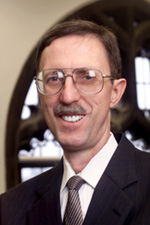 Endowments,
arts center, and south campus are Boyer's priorities for third
term as dean
Endowments,
arts center, and south campus are Boyer's priorities for third
term as dean
John
W. Boyer, AM'69, PhD'75, the Martin A. Ryerson distinguished service
professor in history, will begin his third five-year term as dean
of the College on July 1.
 Since
becoming dean in 1992, Boyer has worked to strengthen the College
curriculum, admissions, foreign-study programs, internships,
and foreign-language instruction. Looking forward, he'd like
to "finish what we've started-though, of course, one never
finishes what one starts in this field. The efforts have begun
well, and I want to be here to ensure they continue to take
root and flourish."
Since
becoming dean in 1992, Boyer has worked to strengthen the College
curriculum, admissions, foreign-study programs, internships,
and foreign-language instruction. Looking forward, he'd like
to "finish what we've started-though, of course, one never
finishes what one starts in this field. The efforts have begun
well, and I want to be here to ensure they continue to take
root and flourish."
Roots
and flourishing, Boyer notes, require financial support. A goal
for his next term is to create endowments for the summer internships
offered by Career and Placement Services, Foreign Language Acquisition
Grants, international and research fellowships, and undergraduate
programs at the Paris Center, scheduled to open in 2003.
Enlivening
the southern end of campus is another goal. "I am eager
to support efforts to build the new arts center on the south
side of the Midway," he says (see "Chicago Journal").
As the College reaches its 4,500-student goal, a new residence
hall also might go south of the Midway. "A fourth residence
hall to augment the three new [Max Palevsky Residential Commons]
dorms would create synergy with a new arts center, and they,
along with BJ, SSA, and the Law School, would help to bring
a vibrancy and critical mass of graduate and undergraduate students
to make the south campus come alive."
The
faculty committee that recommended Boyer's reappointment cited
his energy, forward- looking vision, and dedication to undergraduates.
Before
becoming dean, Boyer served as master of the Social Sciences
Collegiate Division and deputy dean of the Social Sciences Division.
He has also chaired the Committee on European Studies, the Western
Civilization teaching staff, and the Council on Advanced Studies
in the Humanities and Social Sciences.
As
dean, Boyer has turned his historian's eye to the College, producing
a series of papers on seminal events, including Robert Maynard
Hutchins's presidency and student unrest in the 1960s. He hopes
to write on the role of religion at Chicago and the University's
relationship to the neighborhood and the city in the 20th century.
- S.A.S.

![]()
 Endowments,
arts center, and south campus are Boyer's priorities for third
term as dean
Endowments,
arts center, and south campus are Boyer's priorities for third
term as dean Since
becoming dean in 1992, Boyer has worked to strengthen the College
curriculum, admissions, foreign-study programs, internships,
and foreign-language instruction. Looking forward, he'd like
to "finish what we've started-though, of course, one never
finishes what one starts in this field. The efforts have begun
well, and I want to be here to ensure they continue to take
root and flourish."
Since
becoming dean in 1992, Boyer has worked to strengthen the College
curriculum, admissions, foreign-study programs, internships,
and foreign-language instruction. Looking forward, he'd like
to "finish what we've started-though, of course, one never
finishes what one starts in this field. The efforts have begun
well, and I want to be here to ensure they continue to take
root and flourish."